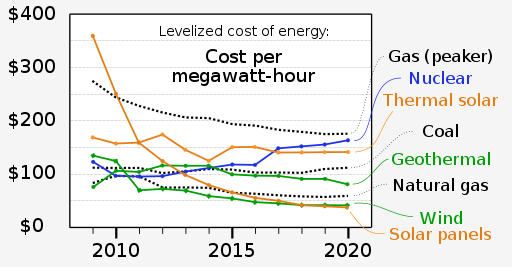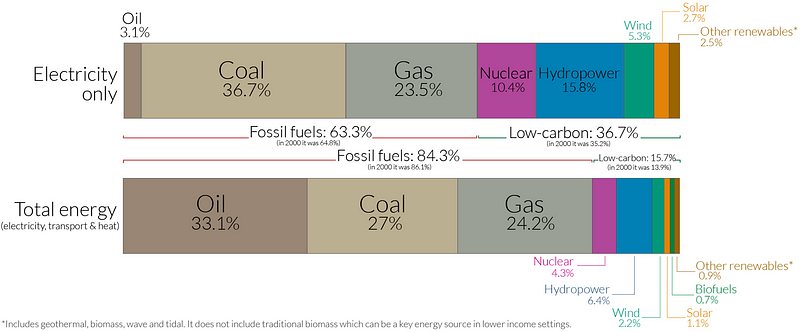Harnessing Clean Energy: The Profound Benefits of Transitioning
Written on
Introduction to Renewable Energy
Renewable energy refers to naturally replenishing resources that can be utilized at a rate comparable to their replenishment. This category encompasses sources such as flowing water, wind, sunlight, organic materials, and ocean waves. In contrast, fossil fuels—like coal, natural gas, and oil—offer more consistent energy but come with significant environmental concerns, including heightened global warming and increased climate change risks.
From an economic standpoint, the Levelized Cost of Energy (LCOE) represents the average expense of producing energy over a facility's operational life. Historically, this metric has favored fossil fuels in terms of profitability. However, recent developments have seen a substantial drop in the LCOE for clean energy, presenting an exciting opportunity for a sustainable growth transition.

The Role of Hydropower and Emerging Renewables
Currently, hydropower stands as the largest source of clean energy globally. Nonetheless, other renewable sources like wind, solar, biomass, and geothermal present even greater growth potential within the current energy landscape.

The Advantages of Energy Transition
Significant transformations often bring uncertainty but also demand adaptability and openness. The shift toward renewable energy has tangible implications for traditional oil sector workers, businesses, investors, and oil-reliant nations. However, it is possible to embrace the benefits of renewables without jeopardizing the well-being of future generations. Let's explore the promising dividends of this energy transition.
Unleashing New Investment Opportunities
Transitioning to cleaner energy sources will foster new investment avenues without the ethical concerns tied to severe environmental damage. For instance, the US Senate is currently deliberating on a legislative proposal that could allocate hundreds of billions to tackle climate change and promote clean energy initiatives. If directed wisely, these funds could enhance wealth distribution and inclusivity.
Providing Affordable Energy Solutions
As inflation rises worldwide, the deployment of advanced clean technologies can lead to reduced electricity and battery storage costs, ultimately benefiting everyday consumers. Investing in research and development will further lower the LCOE of renewables, potentially leading to a significant decrease in rooftop solar installation expenses and lower monthly electricity bills.
Creating New Employment Opportunities
The energy transition also presents a chance to reskill the existing workforce while generating higher-paying jobs in both blue and white-collar sectors, even in suburban areas. New investments in clean technologies will create a range of exciting job opportunities, including roles such as Data Scientists, which are increasingly coveted in the 21st century. Furthermore, educational institutions can adapt by developing courses centered around sustainability.
Building a Sustainable Future
The threats of global warming and climate change are ongoing issues for both current and future generations. A systematic approach to energy transition will ensure the availability of cheaper, cleaner, and more reliable energy, leading to sustainable development. Additionally, responsible energy production can safeguard vulnerable communities, particularly in developing regions, while facilitating global human advancement.
Looking Ahead
To reap the rewards of the energy transition, governments, organizations, and individuals must embrace new mindsets and lifestyles. Innovations like energy-efficient products, electric vehicles and charging infrastructure, offshore wind energy projects, solar shingles, battery storage systems, hydrogen fuel cells, and intelligent grid designs are among the technologies that can deliver the benefits of the energy transition to humanity.
What additional dividends do you believe can arise from the ongoing shift to clean energy? Feel free to share your thoughts in the comments below. If you found this article enlightening, follow me for more discussions on data science, renewable energy, and innovative technologies.